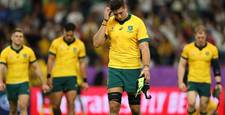By his own admission, Rod Kafer was never an athlete...
By his own admission, Rod Kafer was never an athlete...
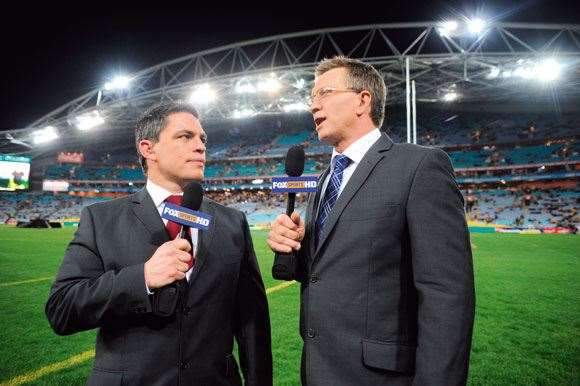 The Fox Sports crew, including Greg Martin, now benefits from Kafer’s wisdom.
The Fox Sports crew, including Greg Martin, now benefits from Kafer’s wisdom.Images: Getty Images
At 175cm and 100-plus kilos he had a body built for comfort, not speed. In his final year at the Brumbies, after a particularly lavish off-season, his team-mates took to calling him “Tooks” – after the rotund Parramatta Eels prop of the day, Mark Tookey. But Kafer knew that a sharp rugby brain was an ample substitute for an athletic physique. And so a startling ability to dissect the game became the hallmark of his game. And, as a result, he played in winning teams. His 37 caps for the Brumbies coincided with three Super finals and the ‘01 title, his 34 games for the Leicester Tigers coincided with a Heineken Cup and Zurich Premiership, his 12 Tests for the Wallabies coincided with the ’99 World Cup. After hanging up the boots he spent 18 months as the head coach at Saracens before returning to Australia where he assumed the presidency of the Rugby Union Players’ Association and a commentating gig at Fox Sports.
Kafer’s time in the game has spanned the rugby gamut. He broke into the top ranks when the game was staunchly amateur, he was on the fringes of the Wallabies as the sport turned professional, and he was at the peak of his powers at the turn of the century when the game was flying high. With rugby’s sails deflated these days, Inside Sport had a coffee with “Tooks” to see what needs to change.
Mate, the game of rugby’s been under a torrent of criticism over the past few years – too much kicking, too many reset scrums, too many games decided by goalkickers. Looking at the sport objectively, has the product changed over the past 10, 20 years? Or have we changed?
I think there are a couple of trends in sport at the moment that are having an impact on how we perceive rugby. Over the past few years we’ve seen a real shift in the sort of activities people find entertaining. Look at all these extreme sports in the mass media now – everything from ultimate fighting to skateboarding. There’s very much a fast-paced mentality to the way we want to be entertained these days, and a very traditional sport like rugby hasn’t had the capacity to keep pace with that. It’s not easy for rugby – it’s a slow-moving game, it’s very much built around tradition and it’s got an unwieldy governing body in the IRB. The expectations of the public have changed and I don’t think rugby’s changed with them. This is the challenge for rugby, more so than changing the laws and the nature of the game. But does the game need work? Yes, it does. And it particularly needs work here in Australia, because we’ve got that unique microcosm of sport where we have four competing ball sports in winter. When there’s a slight shift in the perception of the game we really feel it in Australia. That generally means that if the game starts to struggle here, then in three years it begins to struggle all around the world. And we’re seeing that now. Two years ago, when Australia was first grappling with this concept that the game had become boring, rugby in the northern hemisphere was booming. Now, in the northern hemisphere, they’re starting to grapple with the same questions. They’re literally three years behind us.
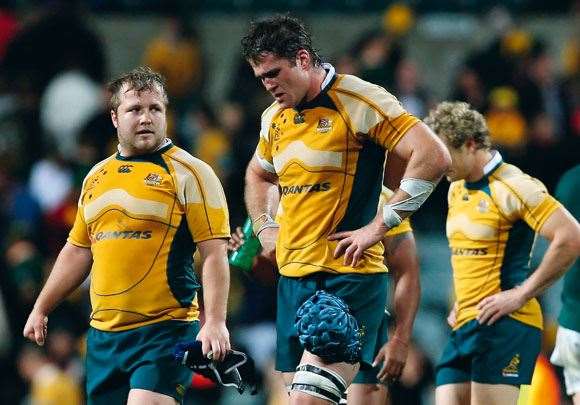 A tougher mental attitude and the Wallabies will be back on top, says Kafer
A tougher mental attitude and the Wallabies will be back on top, says KaferImages: Getty Images
So how does rugby accommodate these shifts in the public’s expectations?
Well, the public’s expectations are fickle. The trick is not to follow the trend, but to position yourself so you know what niche in the market you’re aiming to fill. That’s rugby’s challenge. It needs to find the point where it’s still satisfying the traditionalists, but at the same time attracting new people because it offers something unique. And most of the tenets of rugby rest around it being a game for all shapes and sizes. That’s the fundamental concept that has to be maintained.
Are there specific areas where the game needs to change?
Rugby tends to suffer from the butterfly effect – change a small part of the game and it can have wide-reaching effects. I think we saw that with the ELVs; the minor law changes had a far greater impact on the fabric of the game than intended. These laws, for instance, brought in the quick tap to minimise the number of scrums in the game. But it didn’t change the number of scrums – the ball was in play more so there were more knock-ons, and so more scrums. But it did have an impact on the number of lineouts because teams were no longer kicking for touch on penalties. So it cut the number of lineouts in half, and that was a massive shift in the way the game was played. Fundamentally, I think you’ve got to reward teams who want to score tries. Find the method that does that – more points for tries – and then stick with it. The key is to encourage teams to run the ball, not make minor
changes around the edge of the laws.
Do you fear for the future of rugby in Australia?
I don’t, because, as we’ve seen with many professional sports, you’ve got to go through the bad times to work out what you have to do to win the hearts and minds of people again. We’ve seen that with rugby league a couple of times over the past 20 years – the game’s been struggling but they’ve reacted swiftly, made changes, and the game’s responded. So I see this time as a great opportunity. Plus, we’ve got a World Cup just around the corner in New Zealand. If the Wallabies can do well in a big tournament like that, the landscape will change rapidly.
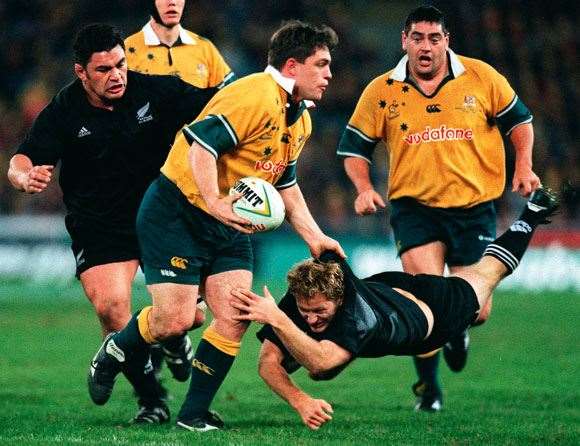 Kafer was built for comfort, not speed ... but he was still bloody hard to stop
Kafer was built for comfort, not speed ... but he was still bloody hard to stopNext year we move into the extended Super 15 format. Do you think this is a good thing for the game?
Absolutely. One thing we’ve never managed to do in this game is fully break the nexus between amateur rugby and professional rugby. Professional players were always linked back to their clubs; they had to play and train with their clubs outside the Super 14 and Test matches. And that’s great – club rugby’s always been the core of the game. But rugby’s at a point now where it needs a full-time professional competition. You know, the NRL has a 26-week comp plus finals, but rugby had a 14-week comp. You need to have a longer period of time where you’re showing your product. So I think the expansion of that competition is great. An expanded 30-week season of Super 15, then Tests – I think that’ll have a massive impact on the way this sport is followed in Australia.
With five Australian sides to be filled, do you think we’ll be spreading our playing talent too thin?
Yeah, I really do. We simply don’t have the numbers to achieve that at the moment. But look at the evolution of the Super competition. In the first six years the South African teams were way off the pace. Only one team – the Sharks – reached the Super finals, in ’96 and ‘01. And in that period South African rugby went through the doldrums; they didn’t have the player numbers to cope with four and then, later, five teams. But since the middle years of the decade just gone, they’ve really improved. They’ve now built the depth to fill five teams – but it took them ten years to do it. And I suspect the same thing will be true for Australia – it’ll take us ten years to build the depth we need to compete on a consistent basis. It’s not a short-term thing.
Who’ll win this year’s Super 14?
I don’t think you can go past the Bulls. There’re only four teams who’ve ever won the Super competition – the Crusaders, Brumbies, Blues and Bulls – and three of those teams have got a really good chance to win it again this year. I’m not sure about the Blues, I don’t think they have the team they need. But the other three will be the teams most likely to win. And I think the Waratahs could be up there as well.
Were you glad to see the return of your old mate Justin Harrison to the Brumbies?
I was really delighted he got another opportunity. Yes, he’s a bloke who’s done some stupid things, but he wants his opportunity for atonement. He’s put his hand up, said, ‘Yep, I’ve made mistakes – here’s a shopping list full of them – but I want an opportunity to prove I’m a good bloke.’ And he’s very genuine about that. It impresses me. He’s getting paid peanuts compared to what he could be earning in Europe – he just wants to play rugby at home and prove he’s got the capacity to do the right thing.
A few months back our readers voted Robbie Deans the worst Australian coach for 2009. What are your thoughts on his performance with the Wallabies?
There’s no question Robbie Deans is a fantastic coach. He’s come to Australia with high expectations, both his own and those of the Australian public. But the challenge was always going to be adjusting his coaching style to that of his new country. And that’s a unique challenge. It’s struck me that Robbie has coached the Wallabies in much the same way that he coached the Crusaders. I think he’s now recognised he needs to do more than that. Provincial rugby’s one thing, Test rugby’s something else altogether. They’re totally different games, played in totally different fashions. I think this year will be the defining year. We’ll find out in the upcoming months whether he’s learnt that lesson or not.
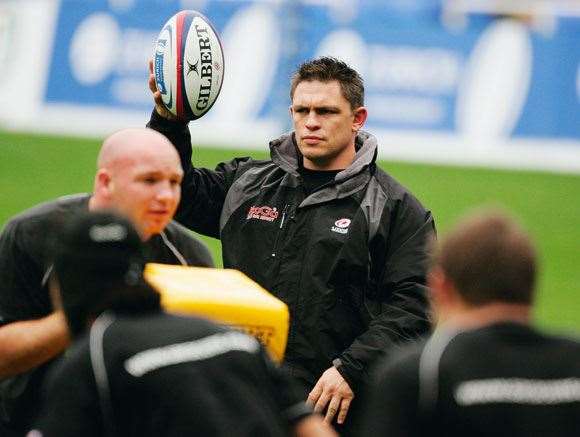 Kafer head-coached Saracens in ‘03-04 .
Kafer head-coached Saracens in ‘03-04 .There seemed to be a real mental fragility to the Wallabies last year …
Funnily enough, I was chatting to Robbie at this time last year and I asked him where the Wallaby team needed to improve. He said there were two areas. Firstly, he said, the players’ physical capabilities needed to be lifted. And secondly, they weren’t tough enough mentally. The ironic thing was that, in saying that, he probably reinforced that point within the team. I wonder whether those comments had an impact, because last year they were particularly fragile. They simply couldn’t make that jump to being a winning team. But that sort of mental fragility is also something that has the capacity to change very quickly. Win a few close ones …
Are you confident the Wallabies can succeed at next year’s World Cup?
There’s no question they can do well. They’ll be one of the top-three-ranked sides in the world and they’ll be in a position to win the tournament, no doubt about it. The threats will come from South Africa and New Zealand. Beyond that there’ll probably be one, maybe two, Northern Hemisphere teams in the mix. I can’t see England being a threat. France are traditionally a team who’ve done well in World Cups – they’ve been in the top four of every tournament. Maybe one of Ireland or Wales could threaten … But really, it’ll be the three Southern Hemisphere teams fighting it out.
Can we rely on another NZ capitulation?
No, I don’t think we can. I’d love to think we could … But there’ll be so much pressure on that team and I have a feeling that’s what they might need – they need to be at home and they need to be under pressure. I think they’ll respond well to it.
– Aaron Scott
Related Articles
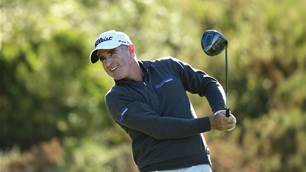
Video interview: Drinks With ... Matt Millar

The Open Final Round Tee Times (AEST)



.png&h=115&w=225&c=1&s=1)




